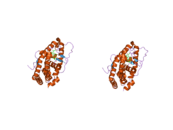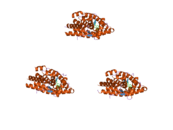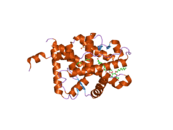Mineralocorticoid receptor
| View/Edit Human | View/Edit Mouse |
The mineralocorticoid receptor (or MR, MLR, MCR), also known as the aldosterone receptor or nuclear receptor subfamily 3, group C, member 2, (NR3C2) is a protein that in humans is encoded by the NR3C2 gene that is located on chromosome 4q31.1-31.2.[4]
MR is a receptor with equal affinity for mineralocorticoids and glucocorticoids. It belongs to the nuclear receptor family where the ligand diffuses into cells, interacts with the receptor and results in a signal transduction affecting specific gene expression in the nucleus.
Function
MR is expressed in many tissues, such as the kidney, colon, heart, central nervous system (hippocampus), brown adipose tissue and sweat glands. In epithelial tissues, its activation leads to the expression of proteins regulating ionic and water transports (mainly the epithelial sodium channel or ENaC, Na+/K+ pump, serum and glucocorticoid induced kinase or SGK1) resulting in the reabsorption of sodium, and as a consequence an increase in extracellular volume, increase in blood pressure, and an excretion of potassium to maintain a normal salt concentration in the body.
The receptor is activated by mineralocorticoids such as aldosterone and its precursor deoxycorticosterone as well as glucocorticoids, like cortisol. In intact animals, the mineralocorticoid receptor is "protected" from glucocorticoids by co-localization of an enzyme, Corticosteroid 11-beta-dehydrogenase isozyme 2 (aka 11β-hydroxysteroid dehydrogenase 2; 11β-HSD2), that converts cortisol to inactive cortisone. It also responds to some progestins. Spironolactone and eplerenone are steroidal MR antagonists of the spirolactone group.
Activation of the mineralocorticoid receptor, upon the binding of its ligand aldosterone, results in its translocation to the cell nucleus, homodimerization and binding to hormone response elements present in the promoter of some genes. This results in the complex recruitment of the transcriptional machinery and the transcription into mRNA of the DNA sequence of the activated genes.[5]
Interactions
Mineralocorticoid receptor has been shown to interact with:
See also
References
- ↑ "Drugs that physically interact with Mineralocorticoid receptor view/edit references on wikidata".
- ↑ "Human PubMed Reference:".
- ↑ "Mouse PubMed Reference:".
- ↑ Fan YS, Eddy RL, Byers MG, Haley LL, Henry WM, Nowak NJ, Shows TB (1989). "The human mineralocorticoid receptor gene (MLR) is located on chromosome 4 at q31.2". Cytogenet. Cell Genet. 52 (1-2): 83–4. doi:10.1159/000132846. PMID 2558856.
- ↑ Fuller PJ, Young MJ (2005). "Mechanisms of mineralocorticoid action". Hypertension. 46 (6): 1227–35. doi:10.1161/01.HYP.0000193502.77417.17. PMID 16286565.
- 1 2 Savory JG, Préfontaine GG, Lamprecht C, Liao M, Walther RF, Lefebvre YA, Haché RJ (Feb 2001). "Glucocorticoid receptor homodimers and glucocorticoid-mineralocorticoid receptor heterodimers form in the cytoplasm through alternative dimerization interfaces". Mol. Cell. Biol. 21 (3): 781–93. doi:10.1128/MCB.21.3.781-793.2001. PMC 86670
 . PMID 11154266.
. PMID 11154266. - ↑ Zennaro MC, Souque A, Viengchareun S, Poisson E, Lombès M (September 2001). "A new human MR splice variant is a ligand-independent transactivator modulating corticosteroid action". Mol. Endocrinol. 15 (9): 1586–98. doi:10.1210/mend.15.9.0689. PMID 11518808.
- ↑ Thénot S, Henriquet C, Rochefort H, Cavaillès V (May 1997). "Differential interaction of nuclear receptors with the putative human transcriptional coactivator hTIF1". J. Biol. Chem. 272 (18): 12062–8. doi:10.1074/jbc.272.18.12062. PMID 9115274.
Further reading
- Hellal-Levy C, Fagart J, Souque A, Rafestin-Oblin ME (2000). "Mechanistic aspects of mineralocorticoid receptor activation". Kidney Int. 57 (4): 1250–5. doi:10.1046/j.1523-1755.2000.00958.x. PMID 10760050.
- Sheppard KE (2002). "Nuclear receptors. II. Intestinal corticosteroid receptors". Am. J. Physiol. Gastrointest. Liver Physiol. 282 (5): G742–6. doi:10.1152/ajpgi.00531.2001. PMID 11960770.
- Kjellander CG (1975). "[The psychotherapeutic society--utopia or nightmare?]". Lakartidningen. 72 (12): 1160–1. PMID 1134129.
- Alnemri ES, Maksymowych AB, Robertson NM, Litwack G (1991). "Overexpression and characterization of the human mineralocorticoid receptor". J. Biol. Chem. 266 (27): 18072–81. PMID 1655735.
- Morrison N, Harrap SB, Arriza JL, Boyd E, Connor JM (1990). "Regional chromosomal assignment of the human mineralocorticoid receptor gene to 4q31.1". Hum. Genet. 85 (1): 130–2. doi:10.1007/BF00276340. PMID 2162806.
- Fan YS, Eddy RL, Byers MG, Haley LL, Henry WM, Nowak NJ, Shows TB (1989). "The human mineralocorticoid receptor gene (MLR) is located on chromosome 4 at q31.2". Cytogenet. Cell Genet. 52 (1-2): 83–4. doi:10.1159/000132846. PMID 2558856.
- Arriza JL, Weinberger C, Cerelli G, Glaser TM, Handelin BL, Housman DE, Evans RM (1987). "Cloning of human mineralocorticoid receptor complementary DNA: structural and functional kinship with the glucocorticoid receptor". Science. 237 (4812): 268–75. doi:10.1126/science.3037703. PMID 3037703.
- Bloem LJ, Guo C, Pratt JH (1995). "Identification of a splice variant of the rat and human mineralocorticoid receptor genes". J. Steroid Biochem. Mol. Biol. 55 (2): 159–62. doi:10.1016/0960-0760(95)00162-S. PMID 7495694.
- Jalaguier S, Mornet D, Mesnier D, Léger JJ, Auzou G (1996). "Human mineralocorticoid receptor interacts with actin under mineralocorticoid ligand modulation". FEBS Lett. 384 (2): 112–6. doi:10.1016/0014-5793(96)00295-5. PMID 8612804.
- Thénot S, Henriquet C, Rochefort H, Cavaillès V (1997). "Differential interaction of nuclear receptors with the putative human transcriptional coactivator hTIF1". J. Biol. Chem. 272 (18): 12062–8. doi:10.1074/jbc.272.18.12062. PMID 9115274.
- Zennaro MC, Farman N, Bonvalet JP, Lombès M (1997). "Tissue-specific expression of alpha and beta messenger ribonucleic acid isoforms of the human mineralocorticoid receptor in normal and pathological states". J. Clin. Endocrinol. Metab. 82 (5): 1345–52. doi:10.1210/jcem.82.5.3933. PMID 9141514.
- Bruner KL, Derfoul A, Robertson NM, Guerriero G, Fernandes-Alnemri T, Alnemri ES, Litwack G (1997). "The unliganded mineralocorticoid receptor is associated with heat shock proteins 70 and 90 and the immunophilin FKBP-52". Recept Signal Transduct. 7 (2): 85–98. PMID 9392437.
- Geller DS, Rodriguez-Soriano J, Vallo Boado A, Schifter S, Bayer M, Chang SS, Lifton RP (1998). "Mutations in the mineralocorticoid receptor gene cause autosomal dominant pseudohypoaldosteronism type I". Nat. Genet. 19 (3): 279–81. doi:10.1038/966. PMID 9662404.
- Lupo B, Mesnier D, Auzou G (1998). "Cysteines 849 and 942 of human mineralocorticoid receptor are crucial for steroid binding". Biochemistry. 37 (35): 12153–9. doi:10.1021/bi980593e. PMID 9724527.
- Halushka MK, Fan JB, Bentley K, Hsie L, Shen N, Weder A, Cooper R, Lipshutz R, Chakravarti A (1999). "Patterns of single-nucleotide polymorphisms in candidate genes for blood-pressure homeostasis". Nat. Genet. 22 (3): 239–47. doi:10.1038/10297. PMID 10391210.
- Freeman BC, Felts SJ, Toft DO, Yamamoto KR (2000). "The p23 molecular chaperones act at a late step in intracellular receptor action to differentially affect ligand efficacies". Genes Dev. 14 (4): 422–34. PMC 316379
 . PMID 10691735.
. PMID 10691735. - Geller DS, Farhi A, Pinkerton N, Fradley M, Moritz M, Spitzer A, Meinke G, Tsai FT, Sigler PB, Lifton RP (2000). "Activating mineralocorticoid receptor mutation in hypertension exacerbated by pregnancy". Science. 289 (5476): 119–23. doi:10.1126/science.289.5476.119. PMID 10884226.
- Hellal-Levy C, Fagart J, Souque A, Wurtz JM, Moras D, Rafestin-Oblin ME (2000). "Crucial role of the H11-H12 loop in stabilizing the active conformation of the human mineralocorticoid receptor". Mol. Endocrinol. 14 (8): 1210–21. doi:10.1210/mend.14.8.0502. PMID 10935545.
- Watzka M, Beyenburg S, Blümcke I, Elger CE, Bidlingmaier F, Stoffel-Wagner B (2000). "Expression of mineralocorticoid and glucocorticoid receptor mRNA in the human hippocampus". Neurosci. Lett. 290 (2): 121–4. doi:10.1016/S0304-3940(00)01325-2. PMID 10936692.
External links
- Mineralocorticoid Receptors at the US National Library of Medicine Medical Subject Headings (MeSH)














